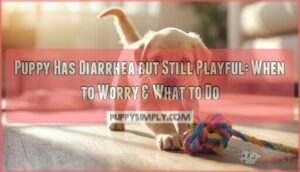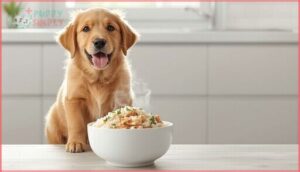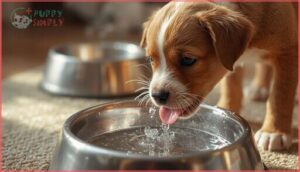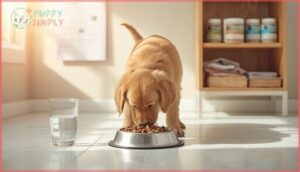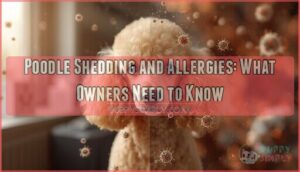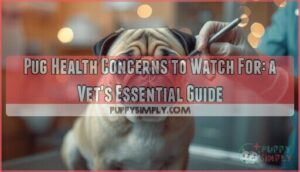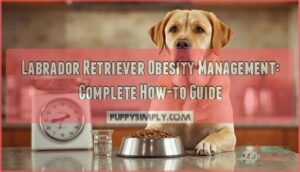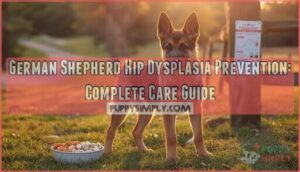This site is supported by our readers. We may earn a commission, at no cost to you, if you purchase through links.
Your eight-week-old golden retriever just demolished her breakfast, bounced through a game of tug-of-war, and now she’s napping peacefully in a sunbeam—but her last bathroom trip left a puddle instead of the solid stool you’re used to seeing. If you’re wondering whether that playful energy means everything’s fine or if you should be racing to the emergency vet, you’re not alone.
Most puppy parents face this exact scenario, caught between a dog who seems perfectly healthy and a digestive system that’s clearly upset. The truth is, a puppy’s behavior tells you just as much about her health as what’s happening in her intestinal tract, and understanding the difference between “keep an eye on it” and “get help now” can save you both unnecessary stress and potentially dangerous delays.
Table Of Contents
- Key Takeaways
- Is It Normal if My Puppy Has Diarrhea?
- Why is My Puppy Playful Despite Diarrhea?
- Main Causes of Diarrhea in Playful Puppies
- Symptoms to Monitor Beyond Diarrhea
- When to Worry: Red Flags in Puppy Diarrhea
- At-Home Care for Mild Puppy Diarrhea
- Foods and Diet Tips for Sensitive Stomachs
- Preventing Future Diarrhea Episodes
- When to Call The Vet for Puppy Diarrhea
- Monitoring Your Puppy’s Recovery and Health
- Frequently Asked Questions (FAQs)
- What should I do if my puppy has diarrhea but is still playful?
- How can I tell if my puppy’s diarrhea is serious?
- What home remedies can I use to treat my puppy’s diarrhea?
- How can I prevent my puppy from getting diarrhea in the first place?
- When should I call my veterinarian about my puppy’s diarrhea?
- Can teething cause diarrhea in playful puppies?
- How long can puppies safely have diarrhea?
- Do certain breeds have more sensitive stomachs?
- Can overfeeding lead to diarrhea in puppies?
- Should I stop puppy training during diarrhea?
- Conclusion
Key Takeaways
- Diarrhea in puppies is common and usually mild if your pup remains energetic, hydrated, and maintains a normal appetite—most cases resolve within 24-72 hours with simple home care like brief fasting, bland diets, and close monitoring.
- Red flags requiring immediate veterinary attention include diarrhea lasting beyond 48 hours, bloody or black stools, persistent vomiting, visible dehydration signs (dry gums, sunken eyes, poor skin elasticity), or sudden lethargy and weakness.
- Common triggers include dietary changes, stress from environmental shifts, parasites (roundworms, Giardia, coccidia), viral infections like parvovirus, and foreign object ingestion—gradual food transitions over 7-14 days and consistent deworming schedules prevent most episodes.
- Track your puppy’s stool quality, frequency, behavior changes, and hydration status in a daily health journal to identify patterns and provide your vet with critical diagnostic information if symptoms worsen or persist.
Is It Normal if My Puppy Has Diarrhea?
Diarrhea in puppies is more common than you might think, especially in the first few months of life. Your puppy’s digestive system is still developing, which means it’s more sensitive to changes and minor upsets than an adult dog’s would be.
That sensitivity also extends to what they eat—even small amounts of certain foods, like pepper or heavily seasoned dishes, can trigger digestive issues in young pups.
Let’s look at what usually causes puppy diarrhea, when it’s not a major concern, and how to tell if your puppy is otherwise healthy.
If symptoms persist or worsen, check out practical steps for treating puppy diarrhea to help your pup feel better fast.
Common Causes of Puppy Diarrhea
Understanding why your puppy has diarrhea starts with knowing the usual suspects. Dietary factors, parasite infections, and environmental stress top the list of diarrhea causes, though bacterial overgrowth and viral pathogens also play a role. Most puppy diarrhea stems from manageable triggers that don’t require panic—just careful attention to gut health.
If your dog has diarrhea but seems otherwise healthy, understanding when to monitor versus when to seek help can make all the difference in their recovery.
Common triggers include:
- Dietary indiscretions – table scraps, spoiled food, or abrupt diet changes can double diarrhea risk
- Parasites – roundworms, hookworms, Giardia, and Coccidia frequently cause loose stools in young pups
- Infections – viral (parvovirus, coronavirus) and bacterial (Campylobacter, Salmonella) pathogens account for 20–60% of cases
- Stress – new homes, boarding, or travel increase stress hormones and disrupt normal gut motility
- Food intolerances – sensitivities to specific proteins or dairy trigger osmotic diarrhea in susceptible individuals
When Diarrhea Isn’t a Serious Concern
Not all puppy diarrhea signals an emergency. If your pup stays playful, hydrated, and hungry, you’re likely seeing mild diarrhea causes—dietary reactions, minor stress, or temporary gut health management issues. Non-severe symptoms resolve within 24–72 hours in healthy puppies.
For persistent cases, adjusting your puppy’s nutrition—like transitioning to a raw dog food diet for puppies—can support firmer stools and better digestion.
When diarrhea in puppies occurs without lethargy or vomiting, puppy hydration remains normal, and energy stays high, you can often manage it at home with close monitoring.
Signs Your Puppy is Still Healthy
Even with puppy diarrhea, healthy puppies show normal behavior—they’re energetic, curious, and keen to play. Watch for a healthy appetite, pink gums, and steady water intake as signs of adequate hydration.
Stable key signs matter too: body temperature between 100–102.5°F and easy breathing. When normal elimination continues (aside from loose stool) and your pup maintains good energy, those diarrhea symptoms likely aren’t serious yet.
Monitor puppy health closely, but don’t panic. It’s crucial to track your puppy’s dog health checklist to identify any potential issues early on.
Why is My Puppy Playful Despite Diarrhea?
It might seem strange that your puppy’s acting like nothing’s wrong while dealing with loose stools. The truth is, puppies can handle minor digestive issues surprisingly well, and their energy level tells you a lot about what’s happening inside.
Let’s look at how to tell the difference between a passing stomach upset and something more serious.
Mild Vs. Severe Digestive Upset
Not all digestive issues signal an emergency. Mild puppy diarrhea usually means loose stools fewer than four times daily, with your pup maintaining a normal appetite and energy. Severe cases involve frequent watery stools with mucus or blood, vomiting, lethargy, and dehydration signs like dry gums.
Gastrointestinal health depends on recognizing these differences—stomach sensitivity resolves quickly with supportive care, while serious intestinal issues need immediate veterinary attention for proper diarrhea treatment.
Puppy Resilience and Behavior Clues
Your pup’s wagging tail and playful antics can tell you more about their health than a single bout of loose stool ever will. Puppies bounce back remarkably fast from minor digestive health issues—eating, playing, and exploring signals they’re coping well despite puppy diarrhea. This canine behavior resilience means their body’s managing puppy stress effectively.
A playful puppy eating and exploring normally is coping well—their energy reveals more about their health than loose stool alone
Watch for sudden shifts in energy or appetite; those changes matter more than temporary loose stools when monitoring puppy health and wellness.
Main Causes of Diarrhea in Playful Puppies
Just because your puppy’s bouncing around doesn’t mean you should ignore the diarrhea—it’s your first clue that something’s off in their system.
Most cases in playful pups trace back to a handful of common culprits, and knowing which one you’re dealing with helps you decide whether to watch and wait or call the vet.
Let’s break down the four main triggers behind those messy accidents.
Understanding what upsets your dog’s stomach—like certain foods, including whether dogs can safely eat bananas—helps you prevent future issues.
Diet Changes and Food Intolerance
Switching kibble brands overnight is like asking your puppy’s gut to shift gears without a clutch. A sudden diet change can trigger puppy diarrhea within 24 to 72 hours, even when food allergies or dietary intolerance aren’t at play. To protect gut health and avoid digestive chaos, follow these canine nutrition principles:
- Gradual transitions – Mix increasing portions of new food with old over 7–14 days
- Watch for problem ingredients – Dairy or certain proteins often cause sensitivity
- Choose fiber wisely – Too much worsens some cases; veterinary-guided nutrition plans help
- Use probiotics – Probiotic benefits include restoring balance during puppy diet shifts
- Track reactions – Reintroduce one ingredient at a time after stabilization
Stress or Environmental Shifts
Change hits puppies hard. Moving homes, new family members, or sudden noise can spike cortisol and trigger stress diarrhea within hours. Your pup’s gut mirrors their emotional state—what looks like simple puppy diarrhea may actually be their body responding to upheaval.
Environmental changes demand patience. Stress management through predictable routines and gentle puppy care and health practices help stabilize both emotions and bowels in diarrhea in puppies cases.
| Stressor | Common Trigger | Calming Techniques |
|---|---|---|
| Relocation | New home, room switch | Gradual puppy socialization |
| Social disruption | Visitors, other pets | Quiet zones, routine |
| Noise exposure | Thunder, fireworks | Noise reduction, safe space |
| Schedule changes | Feeding times shift | Consistent daily rhythm |
| Sleep changes | Different bedding | Familiar scents, comfort items |
Parasites, Bacteria, and Viruses
Invisible invaders wreak havoc inside your puppy’s gut. Roundworms, hookworms, and coccidia rank among the most common intestinal parasites detected in young dogs.
Bacterial infection from Campylobacter or Salmonella can emerge from contaminated food, while viral infection like Parvovirus poses the gravest threat.
Each microbe disrupts gut health and microbe balance, compromising your pup’s digestive defenses and triggering persistent diarrhea.
Eating Foreign Objects
Curiosity kills more than cats—it fills puppy bellies with foreign objects like socks, toys, and household debris. Foreign object ingestion can trigger gastrointestinal blockage or irritation, leading to diarrhea in puppies alongside vomiting and discomfort. Sharp items pose the highest swallowing hazards.
Puppy proofing tips include securing household risks and supervising chews to protect intestinal health from parasites and mechanical damage.
Symptoms to Monitor Beyond Diarrhea
Even if your puppy’s bouncing around like nothing’s wrong, diarrhea doesn’t happen in a vacuum. Other symptoms can creep in quietly, signaling that what started as a minor tummy upset might need professional attention.
Here are the key warning signs to watch for alongside loose stools.
Lethargy or Loss of Appetite
When your puppy loses interest in meals or suddenly seems tired, you’re witnessing potential dehydration signs that need attention. Lethargy causes in puppies with diarrhea often stem from fluid loss and electrolyte imbalance.
Appetite loss accompanying diarrhea in puppies may signal gastrointestinal upset requiring professional assessment.
Monitor these weakness indicators closely—persistent fatigue factors beyond 24 hours warrant veterinary evaluation for proper diarrhea treatment and management.
Vomiting or Blood in Stool
While fatigue and reduced appetite raise concern, vomiting paired with diarrhea escalates the urgency markedly. Vomiting causes in puppies range from stomach infection to more serious GI bleeding. You need to watch for:
- Fresh blood in stool – bright red streaks suggesting lower digestive hemorrhage
- Black, tarry stools – indicating upper GI bleeding requiring immediate care
- Recurrent vomiting within 24 hours – potentially signaling Parvovirus or severe infection
Blood stool combined with puppy diarrhea symptoms demands veterinary attention.
Signs of Dehydration
Vomiting and bloody stools aren’t the only red flags—dehydration signs often appear quietly but progress fast. Check your puppy’s gums: dry, sticky mucous membranes signal fluid loss. Gently pinch the skin at the neck; slow return indicates poor skin turgor and electrolyte imbalance.
Sunken eyes, lethargy, and reduced urination all point to severe dehydration requiring immediate veterinary care.
When to Worry: Red Flags in Puppy Diarrhea
Most cases of puppy diarrhea resolve on their own, but certain warning signs mean it’s time to stop monitoring and start acting. Knowing which symptoms cross the line from “wait and see” to “call the vet now” can literally save your puppy’s life.
Here are the red flags that should send you straight to your veterinarian.
Persistent or Worsening Symptoms
Time becomes critical when diarrhea lingers beyond 24 hours—especially if your puppy shows dehydration signs like pale gums or reduced skin elasticity. Persistent diarrhea in puppies warrants veterinary evaluation within 24–48 hours.
Watch for vomiting causes and fever response, as these symptoms signal the need for emergency care and possibly stool analysis to protect your puppy’s gastrointestinal health.
Bloody, Black, or Explosive Diarrhea
Beyond lingering symptoms, you need to recognize severe warning signs that demand urgent veterinary attention for diarrhea in puppies:
- Bloody stools suggest gastrointestinal bleeding or canine hemorrhage from infections or inflammatory bowel disease
- Black, tarry diarrhea indicates digested blood requiring fecal analysis
- Explosive, violent episodes may signal hemorrhagic gastroenteritis
- Minimal stool with visible blood still warrants immediate puppy diarrhea treatment
Accompanying Vomiting or Weakness
When your puppy combines vomiting with diarrhea, dehydration risks escalate fast—often within 12 to 24 hours. Weakness signs like reluctance to move or decreased responsiveness signal dangerous electrolyte balance disruption affecting gut health.
Even mild vomiting paired with puppy diarrhea warrants veterinary help, since rapid fluid loss can quickly overwhelm a young dog’s system and require immediate puppy diarrhea treatment.
At-Home Care for Mild Puppy Diarrhea
If your puppy’s diarrhea seems mild and they’re still eating, drinking, and playing normally, you can often manage the situation at home with a few simple steps. The goal is to give their digestive system a chance to settle while preventing dehydration.
Here’s what you can do to help your puppy feel better.
Withholding Food Briefly
Sometimes your puppy’s gut just needs a break. A 12 to 24-hour fast offers key fasting benefits by giving the digestive system time for gut rest, which can help resolve mild puppy diarrhea.
Keep fresh water available at all times—hydration tips stress this is non-negotiable to prevent dehydration.
This brief pause sets the stage for food reintroduction and aids canine gastrointestinal health naturally.
Introducing a Bland Diet
After your puppy’s brief fast, a bland diet becomes your best ally for digestive care. Mix boiled chicken breast (skin removed) with plain white rice at a 1:2 ratio—this combo offers bland diet benefits by soothing gut health while supporting puppy nutrition.
Feed small portions four to six times daily, then gradually reintroduce regular food over three to seven days for a smooth food shift.
Ensuring Proper Hydration
Diarrhea drains fluid fast, making water intake your puppy’s lifeline for fluid balance and electrolyte management. Keep fresh water accessible at all times, especially after meals or play.
Essential hydration techniques to prevent dehydration signs:
- Offer small, frequent sips if your puppy won’t drink large amounts
- Refresh water bowls every 6–12 hours to encourage drinking
- Check gums for moisture and skin elasticity daily
- Consider puppy-safe oral rehydration solutions following package instructions
Using Puppy-Safe Probiotics
Think of probiotics as a tiny cleanup crew for your puppy’s gut health, restoring microbiome balance after digestive upset. Canine nutrition experts often recommend puppy-specific strains—like Lactobacillus and Bifidobacterium—to support gastrointestinal health in dogs and shorten diarrhea duration.
Start with a low dose for 3–5 days, monitoring stool response. Choose products with veterinary backing to guarantee probiotic safety and effective probiotic benefits for puppy care and nutrition.
Foods and Diet Tips for Sensitive Stomachs
When your puppy’s stomach is on the fritz, the right food choices can make all the difference between quick recovery and prolonged discomfort. A gentle, carefully selected diet gives their digestive system the break it needs to heal while still providing essential nutrition.
Let’s look at the best food options, how to shift safely, and what you should keep out of reach during recovery.
Recommended Bland Diet Options
When your pup’s tummy is upset, bland food options can make all the difference. Boiled chicken breast paired with white rice offers gentle protein sources and easy carbohydrates that won’t stress the digestive tract.
Plain pumpkin puree aids fiber regulation, while homemade diets using lean turkey or white fish provide variety.
This bland diet approach tackles diarrhea in puppies causes and symptoms while ensuring proper canine nutrition and diet during recovery.
Gradual Food Transitions
Once you’ve settled on the right bland diet, food introduction shouldn’t happen overnight. A progressive diet planning approach over 7 to 10 days protects gut health and prevents puppy diarrhea from flaring up again.
Start with this feeding schedule for canine nutrition and dietary management:
- Replace 10% of old dog food with new each day
- Monitor stool consistency and energy levels closely
- Revert if digestive upset returns
This nutrient balance aids dietary considerations for puppies with sensitive stomachs.
Foods and Treats to Avoid
Just as important as knowing what to feed is understanding your toxic food list. Chocolate, onions, garlic, and xylitol-containing products can trigger dietary intolerance or worse. Fatty foods like bacon worsen diarrhea in puppies, exacerbating causes and symptoms. Most dairy products also pose problems.
Safe treats and careful dietary management protect your puppy’s sensitive system while supporting proper puppy nutrition and recovery.
Preventing Future Diarrhea Episodes
Once your puppy’s stomach settles, your focus naturally shifts to keeping things stable going forward. The good news is that most diarrhea episodes are preventable with a few consistent habits.
Let’s walk through three practical strategies that protect your puppy’s digestive health long-term.
Safe Diet Changes
When your puppy’s tummy settles, don’t rush back to their usual kibble. Food shift is key to maintaining gut health and preventing future episodes of diarrhea in puppies.
- Start with bland diets like boiled chicken and white rice for 24–48 hours
- Mix increasing amounts of regular food over 5–7 days to avoid dietary intolerance
- Keep fresh water available constantly to support hydration and recovery
- Skip fatty treats and table scraps that can trigger puppy diarrhea
- Monitor stool quality during the shift—firm stools mean you’re on track
Probiotic benefits shine during dietary management, helping restore normal intestinal flora while you gradually reintroduce regular food.
Regular Deworming and Vet Checks
Beyond smart feeding, parasite control forms your defense against diarrhea in puppies. Deworming schedules usually start at two weeks and continue every two weeks until 12 weeks, then monthly until six months—veterinary help tailors this to your pup’s risk.
Vet visit frequency matters: routine puppy vaccinations, fecal exams, and health record keeping catch parasites early, preventing causes and symptoms before diarrhea strikes.
Puppy-Proofing Your Home
Your living space can create unexpected puppy health issues when overlooked home hazards hide in plain sight. Solid pet safety and floor security protect both digestion and puppy development—here’s where to focus:
- Lock away toxic substances like cleaners and medications in high cabinets
- Secure electrical protection by covering outlets and taping down cords
- Remove small chokables from floors to prevent foreign body ingestion
Smart pet owner responsibilities and dog health and hygiene start with thoughtful puppy care environments.
When to Call The Vet for Puppy Diarrhea
Even if your puppy seems playful and happy, certain symptoms mean it’s time to pick up the phone and call your vet. Some warning signs point to infections, parasites, or complications that won’t resolve on their own.
Here’s what you need to watch for, what happens during the vet visit, and which tests might be necessary.
Warning Signs Requiring Immediate Care
Some diarrhea symptoms demand immediate veterinary emergency procedures. Dehydration risks escalate when you notice sunken eyes, sticky gums, or skin tenting beyond two seconds.
Severe vomiting that persists for over 12 hours, bloody stools (especially black or tarry), and lethargy signs like collapse or inability to stand all require emergency care.
Don’t wait if your puppy shows these critical red flags.
What to Expect at The Vet Visit
Your vet consultation begins with a thorough puppy examination focusing on hydration status, temperature, and overall condition.
The veterinarian will ask about recent diet changes, stress factors, and exposure to new environments during this vet visit. Expect questions about stool consistency and frequency—this vet visit prep helps determine whether diagnostic tests or immediate treatment plans are necessary for your pup’s diarrhea.
Diagnostic Tests and Treatment Options
Once diagnostic work begins, your vet will likely start with fecal analysis to detect parasites, bacteria, or viral DNA—a single test can miss intermittent shedding, so repeat checks may be needed. Blood tests help rule out parvovirus or metabolic issues, while treatment often includes fluid therapy for dehydration, puppy-safe probiotic treatment to restore gut balance, and antibiotic use only when bacterial infection is confirmed.
- Fecal flotation and antigen tests catch common parasites like Giardia and roundworms
- Complete blood count flags viral infections such as parvovirus through low white cell counts
- Intravenous fluids correct dehydration quickly in hospitalized puppies with severe diarrhea
- Targeted antibiotics and probiotics address confirmed infections while supporting recovery
Regular parasite checks are essential for maintaining puppy health.
Monitoring Your Puppy’s Recovery and Health
Once you’ve addressed the diarrhea, your work isn’t quite finished. Recovery happens gradually, and your puppy’s body needs time to stabilize and return to normal.
Keeping an eye on a few key areas will help you catch any setbacks early and confirm your pup is truly on the mend.
Tracking Stool Quality and Frequency
Keeping a daily log helps you catch trouble early and gives your vet vital clues. Record each bowel movement’s timing, appearance, and any unusual features like mucus or blood. This simple table format works well:
| Day/Time | Stool Consistency | Color | Notes |
|---|---|---|---|
| Mon 8am | Soft, formed | Brown | Normal |
| Mon 2pm | Watery | Yellow | After new treat |
| Tue 9am | Loose | Brown w/mucus | No vomiting |
| Tue 6pm | Firming up | Brown | Appetite good |
| Wed 7am | Formed | Brown | Back to normal |
Track digestive patterns alongside meals and activities to pinpoint what’s triggering your puppy’s diarrhea symptoms.
Watching for Behavior or Appetite Changes
Your puppy’s playfulness tells you more than any thermometer—watch for the moment that tail-wagging energy starts to fade. Behavioral signs like refusing breakfast, skipping favorite treats, or sleeping through playtime signal your pup’s digestive upset is worsening.
These appetite shifts and energy dips are vital health monitoring clues that diarrhea in puppies causes deeper trouble requiring veterinary attention.
Maintaining a Health Journal
Once you’ve spotted those behavioral shifts, journaling tips become invaluable for puppy monitoring and record keeping. A simple diary management system helps you track patterns that veterinary advice and guidance relies on. Document:
- Each bowel movement’s date, time, and consistency using a standardized scale
- Daily appetite, water intake, and energy levels alongside any vomiting
- Dietary changes, treats, or medications with observed effects
- Vet visit dates, diagnoses, and treatment outcomes
This health tracking reveals whether diarrhea in puppies causes worsening symptoms or improves with treatment.
Frequently Asked Questions (FAQs)
What should I do if my puppy has diarrhea but is still playful?
Monitor for dehydration every 2–4 hours, offer small water sips, and withhold food for 12–24 hours. Gradually reintroduce a bland diet like boiled chicken and rice, then contact your vet within 24 hours.
How can I tell if my puppy’s diarrhea is serious?
Watch for diarrhea duration beyond 48 hours, blood or black stool consistency, vomiting, lethargy, or dehydration signs like dry gums. These health indicators suggest canine gastroenteritis needing urgent veterinary care.
What home remedies can I use to treat my puppy’s diarrhea?
Most mild cases respond well within 24 to 48 hours using a bland diet—boiled chicken and white rice—paired with probiotic supplements and electrolyte balance support to restore gastrointestinal health naturally.
How can I prevent my puppy from getting diarrhea in the first place?
Feed a consistent, high-quality diet and shift foods gradually over 5–7 days.
Keep vaccinations current, deworm regularly, puppy-proof your home, and maintain stable routines to support gastrointestinal health and prevent diarrhea in puppies.
When should I call my veterinarian about my puppy’s diarrhea?
Contact your veterinarian if diarrhea persists beyond 24 hours, especially in puppies under six months. Seek emergency veterinary care immediately if you notice vomiting, blood in stool, lethargy, dehydration, or weakness.
Can teething cause diarrhea in playful puppies?
Teething itself doesn’t directly cause diarrhea in puppies. However, behavioral changes during oral development—like chewing foreign objects or dietary exploration—can trigger digestive issues.
True diarrhea usually signals parasites, infections, or puppy nutrition problems requiring veterinary evaluation.
How long can puppies safely have diarrhea?
Most cases clear up within 24 to 72 hours, but diarrhea lasting beyond 48 hours warrants a vet visit to check for infections, parasites, or dehydration risks that threaten your puppy’s recovery.
Do certain breeds have more sensitive stomachs?
Yes, certain breeds carry genetic predispositions to sensitive stomachs and nutritional sensitivities. German Shepherds and small toy breeds show higher rates of dietary intolerance, requiring careful attention to breed dietary needs and canine gut health.
Can overfeeding lead to diarrhea in puppies?
Puppy portions play a powerful role in digestive health. Overfeeding overwhelms your pup’s gut, triggering loose stools within 24 to 48 hours—especially when rich treats disrupt gut balance alongside oversized meals.
Should I stop puppy training during diarrhea?
Keep sessions short and gentle if your puppy stays alert, but pause training entirely if you notice lethargy, vomiting, or bloody stool.
Veterinary guidance ensures safe diarrhea management during puppy development and growth.
Conclusion
When your puppy has diarrhea but is still playful, you’re witnessing her body’s ability to handle minor digestive upset while staying resilient. Trust your instincts, watch for warning signs like lethargy or blood, and remember that most cases resolve with simple home care.
Your vigilance matters—tracking her symptoms, maintaining hydration, and knowing when to call your vet transforms worry into action. A bouncy puppy with temporary tummy troubles usually just needs time, patience, and your steady presence.
- https://elsevier.blog/sub-points-outlining-organization/
- https://mcluhan.unk.edu/lawson/?page_id=187
- https://github.com/vinhphunguyen/how-to-write-a-paper/blob/master/how-to-write-paper.brf
- https://www.avma.org/resources-tools/pet-owners/petcare/canine-parvovirus
- https://www.proplanvetdirect.com/canine-fortiflora-probiotic

